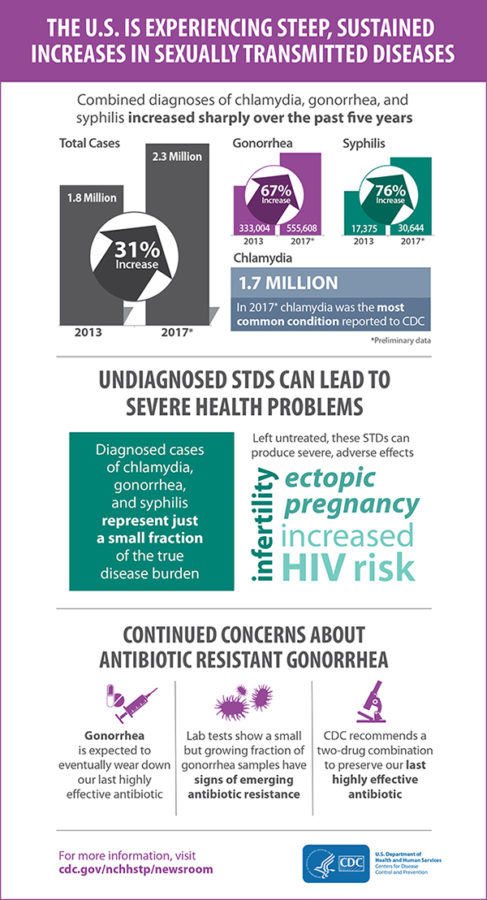The Gift that Keeps on Giving
Providing Free Condoms to Improve Teen Sexual Health
STD rates have risen steeply within the past year. This infographic is part of the CDC’s annual STD Prevention Conference Report.
In 2017, STD cases hit an all time high with 2.3 million reported cases of chlamydia, gonorrhea, and syphilis, marking the fourth year of sharp increases. Chlamydia remained the most common, while syphilis increased by 76% and gonorrhea increased 67%. It is speculated that in the near future, gonorrhea will become completely resistant to all antibiotics.
However, the outlook is not completely bleak. Some school districts, such as the one in Montgomery County, Maryland, are beginning to provide free condoms for their students. The goal is to promote safe sex, rather than ignoring a prevalent issue. In addition to the condoms, the high schools are providing education on sexually transmitted infections and counseling to create a well-rounded program.
Four high schools with health clinics in Montgomery County will begin to offer the condoms at the beginning of the school year. Public health officials are soon hoping to expand the service to all high schools, and even middle schools, within the area as well.
The move has been met with some controversy from community members who believe the choice was made without their input, but that is being met with an equal amount of support from concerned parents and public health officials.
In Poudre School District, the only school with condoms for students is Centennial High School because their health clinic is run through a separate entity, outside of the district. Otherwise, students are on their own to get condoms, whether that is through local health clinics such as the Larimer County Department of Health, Planned Parenthood, or their own financial means.
Safe sex, while always important, is perhaps more important than it has ever been before due to the rise of antibiotic resistant STDs. When proper education and tools are combined, both teen STD rates and pregnancy are significantly reduced, which have further implications on public health. Preventing STDs prevents future health issues such as ectopic pregnancies, cervical cancer, and infertility.

Karenna Doctor is a Senior at Rocky Mountain High School and is also a staff member of the school literary and arts magazine, The Looking Glass. Outside...









